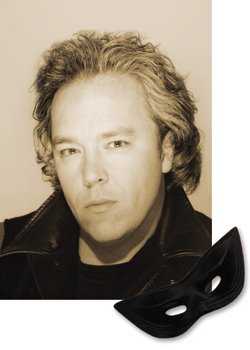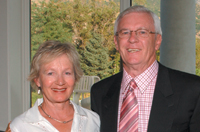
|
|
About Continuum Advertising Advisory Committee Archives Contact Us Continuum Home Faculty/Staff Subscribe related websites Alumni Association Marketing & Communications University of Utah Home |

Spotlight Robert Breault, director of the U’s opera program, is a master at juggling teaching and performing—to the benefit of both. By Catherine Reese Newton  When Robert Breault was considering joining the University of Utah faculty in 1992, colleagues told him he was crazy. Not that he could blame the skeptics, having been one himself scarcely more than a year earlier. He remembers his response when his wife floated the idea of moving to Salt Lake City after the couple passed through on their honeymoon: “Who would I sing with, the Mormon Tabernacle Choir?” Within a couple of months of moving to Utah, Breault was doing exactly that—accompanying the choir to Israel as the tenor soloist in Berlioz’s Requiem. Even so, Breault says, “It was an unlikely place to come” for a singer who was just embarking on a career after completing a doctorate at the University of Michigan. “Everybody said, ‘You’ve gotta go to New York or Germany.’ I’m most proud of the fact that I defied that professional mentality. I was told that I would not be happy; I was told I would never have a career as a singer.” Quite the contrary. Not only has Breault performed numerous times with the Mormon Tabernacle Choir, Utah Symphony, Utah Opera, and many other locally based musical organizations, he’s also sung about 70 roles with opera companies and orchestras throughout North America and Europe during his time at the U. A recent triumph was Handel’s Semele at New York City Opera, where Breault won lavish praise from critics for his portrayal of Jupiter and Apollo. Meanwhile, he has been growing the U’s opera program, which had been without a director for a few years before he arrived but now graduates the largest number of students in the School of Music. “He’s having a lovely career,” says Utah Opera Artistic Director Christopher McBeth, who praises Breault’s chameleonlike ability to sing a wide variety of roles convincingly, from the romantic lead in Gaetano Donizetti’s Lucia di Lammermoor to the sinister Peter Quint in Benjamin Britten’s The Turn of the Screw to the tormented Don Josť in Georges Bizet’s Carmen. “One of the most glorious things to me is the way the University has allowed me to grow and learn and mature” through outside engagements, Breault says. He takes on about four a year, and he feels the experience makes him a better teacher. College of Fine Arts Dean Raymond Tymas-Jones agrees. “The students are very enthusiastic and hungry for all the knowledge and information he can share and bring to campus from his own professional career and connections,” Tymas-Jones says. “I was so grateful as a student that he was actively performing,” says soprano Celena Shafer BFA’97 MFA’99, one of the opera program’s brightest success stories. Not only does the experience enrich his teaching and boost the program’s stature in the opera world, but his occasional absences—when Jeffrey Price (associate professor and music director, Lyric Opera ensemble) and various opera professionals step in—also make the singers more independent learners, she explains. “He creates singers who are self-sufficient,” Shafer says. “I decided a long time ago that they would have to be creative,” Breault says. “I teach them how to learn. A wonderful thing about teaching is helping people realize they can do things they didn’t know they could.” Breault played drums in various rock bands and sang in school and church choirs while growing up in Marinette, Wis. His percussion skills won him a music scholarship to St. Norbert College in De Pere, Wis., but he soon discovered that the college offered more opportunities in voice, and he changed his focus accordingly. (One of his saddest memories is selling his drum kit to buy an electric piano before heading to graduate school at Michigan.) His hobbies outside opera now include growing roses, cooking, model trains, and photography; several of his photos decorate the Salt Lake home he shares with his wife, occupational therapist Julia Haywood-Breault, and their seven miniature dachshunds. “These hobbies allow me to be a better singer,” he notes. Breault recently turned 45, and his hair has grayed a bit since his first day of classes at the U, when an unwitting student asked him, “Dude, do you know what the teacher looks like?” But as Kathy Sorensen PhD’91, artistic director of the International Children’s Choir, and her young singers can attest, he still knows how to have fun. Breault has done vocal coaching for the choir since 1993 and has accompanied the children on tour to Europe. “He’s like the biggest of the kids,” says Sorensen, recalling a party in Salzburg, Austria, where some of the singers reenacted a scene from The Sound of Music. Sorensen says Breault’s portrayal of little Gretl von Trapp was the funniest thing she’s ever seen. Breault also is “one of the key voice teachers” in Utah Opera’s Young Artists Program, McBeth says. “A lot of our young artists have benefited from working with him.” The relationship is reciprocal, says Breault, noting that McBeth often speaks to the U’s opera students. “Instead of a big chasm between the producing company and the University, we will do more and more together.” It’s all part of the University’s role in the community, he says. Likewise, the opera program’s place in the University of Utah community is important to Breault. “Working at the University is a great thrill,” Breault notes. “There are so many people doing what they do so wonderfully.” — Catherine Reese Newton has written about opera for The Salt Lake Tribune since 1990. To hear samples of Robert Breault’s recordings, visit www.bobbreault.com. Return to Winter 2008-09 table of contents | Back to top Leon and Karen Peterson help young musicians fulfill their dreams Leon Peterson BS’64 MBA’67 and Karen Fotheringham Peterson BS’64 may not be musicians, but they still play a key supporting role for the University of Utah School of Music. As chairs of the school’s advisory board since 2005, the Petersons have raised funds for dozens of $3,000 annual scholarships for music students at the U—nearly 60 of them this year alone, notes School of Music Development Director April Walters MPA’98. The couple has personally financed 44 of those scholarships. Other prominent contributors are Bud and Dixie Stoddard, Boyd BA’59 and Jill Smith, Mack BA’60 and Julia Watkins BA’64, and Bob BA’68 and Janene Bonnemort BS’67. “Leon and Karen have been amazingly supportive of our program,” says School of Music Director Robert Walzel. “They are proactive in their own giving and in encouraging others to give to the School of Music.” Robert Breault says the Petersons’ scholarship support is working. “We’re attracting students who normally would have gone out of state.” The Petersons cultivate connections between musicians and prospective donors by sponsoring events such as the popular yurt evenings, at which guests travel to a mountain yurt in a snowcat-drawn sleigh to enjoy a catered dinner and hear U of U students and faculty perform what Leon Peterson calls “the best of the best of the best” of their craft. “Our goal is to make it a premier school of music not only in the U.S. but [also] throughout the world,” Peterson says. “We feel great students attract great faculty, and great faculty attract great students.” |